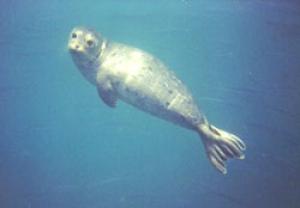eals Protect Brain, Conserve Oxygen By Turning Off Shivering Response On Icy Dives
 Seals shiver when exposed to cold air but not when diving in chilly water, a finding that researchers believe allows the diving seal to conserve oxygen and minimize brain damage that could result from long dives.
Seals shiver when exposed to cold air but not when diving in chilly water, a finding that researchers believe allows the diving seal to conserve oxygen and minimize brain damage that could result from long dives.The researchers presented the study at The American Physiological Society's conference "Comparative Physiology 2006: Integrating Diversity," in Virginia Beach, Va., October 8-11. The researchers, Arnoldus Schytte Blix, Petter H. Kvadsheim and Lars P. Folkow hail from the University of Tromsø, located above the Arctic Circle in Tromsø, Norway.
The research provides insight into how seals allow their bodies to cool (become hypothermic) during a dive, presumably to better cope with a lack of oxygen (hypoxia). Research into hypothermia and hypoxia is important because they are problems that affect people under a variety of circumstances. Doctors often are called upon to treat people who have suffered accidental hypothermia, for example, as a result of falling into the ocean or becoming lost during the winter. In addition, several hundred thousand people die or are irreversibly injured each year following cardiac arrest, stroke or respiratory disorders which cause inadequate oxygen supply to the brain, Folkow explained.
Folkow will present a second study on hypoxia, involving diving birds, at the conference. The study "Neuronal hypoxic tolerance in diving birds and mammals," examines how diving birds and seals preserve brain cell function in the face of oxygen deficits. The study is by Folkow, Stian Ludvigsen and Blix, of the University of Tromsø and Jan-Marino Ramirez of the University of Chicago.
Seals Protect Brain, Conserve Oxygen By Turning Off Shivering Response On Icy Dives

0 Comments:
Post a Comment
<< Home